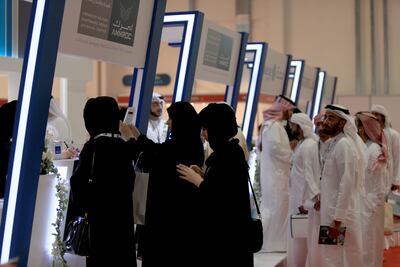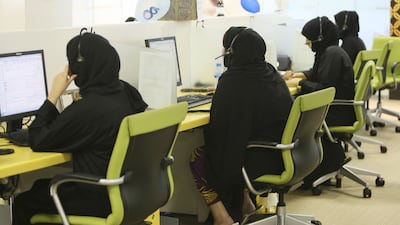For employers, finding the right person for the job can be a challenge at the best of times. In the UAE, news that nearly 80,000 Emiratis are now working in the private sector – a leap of 30,000 in the past six months – reveals that Emiratisation is not only changing the composition of the country’s workforce, but is deepening the pool of talent available to businesses.
The latest figures were released on Sunday after a deadline passed for companies that have a workforce of 50 or more employees to meet a 3 per cent Emiratisation target. The number of UAE citizens working in the private sector is now the highest ever and represents a 57 per cent increase since the end of last year, when 50,228 Emiratis were employed outside the public sector.
As notable as these figures are, Emiratisation is about more than just finding gainful employment for citizens. The UAE is rapidly changing, and a diversifying economy will require a diverse range of talents and skills. Although foreign-born employees at all levels have played a pivotal role in the Emirates’ success so far, now more than ever they are being complemented by a local workforce that is rooted in the country and its identity.

Emiratisation is one aspect of the UAE’s journey to building a knowledge-based economy that encourages and requires a high level of education and qualifications among its people. In this sense, it is both a process of generational change and an investment for the future.
However, introducing fundamental change is often not easy, particularly when it comes to people’s livelihoods. For years, many citizens focused on the public sector, attracted by the benefits and stability that it often offers. The private sector can be a challenging environment, with a robust work culture fuelled by the reality that a bottom line of profit and loss is involved. In this sense, Emiratisation will not only alter the composition of the national workforce; it can lead to profound changes in work culture and attitudes.
But it seems that this is the kind of change that many people – particularly younger ones – want. Most Emirati graduates surveyed recently by PwC Middle East – 61 per cent – expressed an interest in joining the private sector. In that vein, Sunday’s figures represent a journey, not a final destination. Some, who are already in the private sector, told PwC they were considering a return to the public sector, attracted by the more competitive compensation and benefits packages on offer.
This should give private sector businesses pause for thought and encourage some creative thinking about retaining talent. Beyond salaries, employees value meaningful work, career progression and training. Intensifying recruitment efforts and talent spotting at careers fairs, schools and universities is one step to help build a connection between the Emirati workforce of the future and the private sector.
But the direction of traffic is one way. More Emiratis will be involved in the private sector in future, adding to many companies’ talent mix and enhancing their local brand. As with many developments in the UAE, Emiratisation is a partnership – this time between the government and businesses. It is a joint approach that is yielding results. The next phase will be to embed these changes and make the choice about whether to work in the public or private sector one that is guided by opportunity, fulfilment and excitement.


